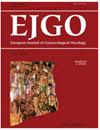Surgical and systemic therapies for addressing occult disease in advanced epithelial ovarian cancer
IF 0.5
4区 医学
Q4 OBSTETRICS & GYNECOLOGY
引用次数: 0
Abstract
The incidence of peritoneal recurrence in advanced epithelial ovarian cancer (EOC) is high and could be attributed to the high prevalence of occult disease the persists despite complete cytoreductive surgery (CRS) and systemic chemotherapy. Several therapeutic approaches have been used to address such occult disease. Hyperthermic intraperitoneal chemotherapy (HIPEC) acts on microscopic disease as well as free intraperitoneal cancer cells shed during surgery, thus, reducing the risk of recurrence. Maintenance therapies like Poly ADPRibosyl Polymerase (PARP) inhibitors and the anti-angiogenic agent bevacizumab are used as maintenance therapies to delay recurrence. The most definitive way to eradicate such occult disease completely is resection of the peritoneum. The high preponderance of occult disease in the parietal peritoneum and some regions of the visceral peritoneum has led some surgeons to investigate the role of a total parietal peritonectomy (TPP) performed along with wide resection of the visceral peritoneum as a strategy for addressing occult disease. The mechanism of action differs from that of HIPEC and systemic therapies. It is possible that the benefit of each of these therapies is additive. EOC is a heterogeneous disease with a number of clinicopathological and molecular factors influencing the prognosis. There are likely to be different subgroups of patients that benefit from each of these 4 therapies or a combination of these. In this manuscript, we review the rationale and current evidence for the use of each of these therapies and discuss the potential role of a TPP in light of other晚期上皮性卵巢癌症隐匿性疾病的外科和全身治疗
晚期上皮性癌症(EOC)腹膜复发的发生率很高,可归因于隐匿性疾病的高患病率,尽管进行了完全的细胞减灭术(CRS)和全身化疗,但这种疾病仍持续存在。有几种治疗方法已经被用来治疗这种隐性疾病。高温腹膜内化疗(HIPEC)对显微镜下的疾病以及手术过程中游离的腹膜内癌症细胞脱落起作用,从而降低复发的风险。维持疗法,如聚腺苷酸核糖聚合酶(PARP)抑制剂和抗血管生成剂贝伐单抗,被用作延缓复发的维持疗法。彻底根除这种隐性疾病的最明确方法是腹膜切除术。隐匿性疾病在顶叶腹膜和内脏腹膜的某些区域具有很高的优势,这促使一些外科医生研究了全顶叶腹膜切除术(TPP)和内脏腹膜大面积切除术作为治疗隐匿性疾病的策略的作用。作用机制不同于HIPEC和系统疗法。这些疗法中的每一种都可能带来额外的益处。EOC是一种异质性疾病,有许多临床病理和分子因素影响预后。可能有不同的患者亚组从这4种疗法中的每一种或这些疗法的组合中受益。在这份手稿中,我们回顾了使用每种疗法的基本原理和当前证据,并根据其他疗法讨论了TPP的潜在作用
本文章由计算机程序翻译,如有差异,请以英文原文为准。
求助全文
约1分钟内获得全文
求助全文
来源期刊
自引率
25.00%
发文量
58
审稿时长
1 months
期刊介绍:
EJGO is dedicated to publishing editorial articles in the Distinguished Expert Series and original research papers, case reports, letters to the Editor, book reviews, and newsletters. The Journal was founded in 1980 the second gynaecologic oncology hyperspecialization Journal in the world. Its aim is the diffusion of scientific, clinical and practical progress, and knowledge in female neoplastic diseases in an interdisciplinary approach among gynaecologists, oncologists, radiotherapists, surgeons, chemotherapists, pathologists, epidemiologists, and so on.

 求助内容:
求助内容: 应助结果提醒方式:
应助结果提醒方式:


